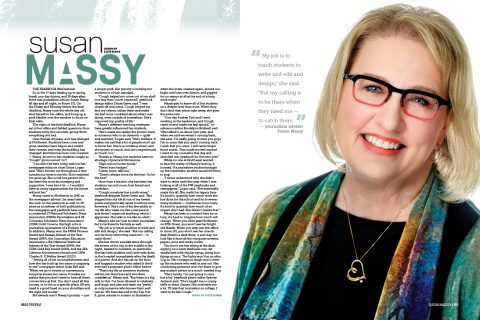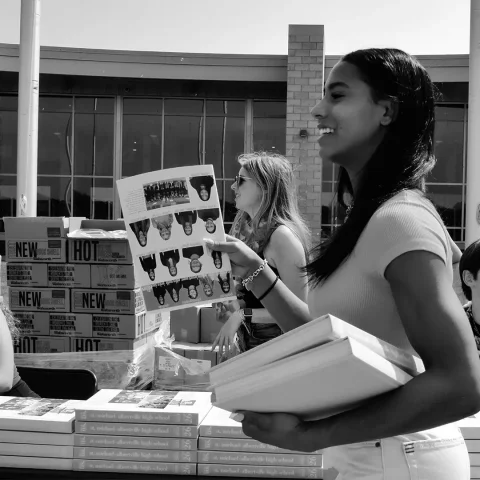Forty-five years. That’s how long yearbook adviser Susan Massy taught. Though many associate her with yearbook greatness, she did not always work with the yearbook program. She began advising the Lair yearbook at Shawnee Mission Northwest High School in Shawnee, Kansas, in 1988.
In her time as a teacher and scholastic journalism adviser, Massy’s yearbook program became one of the best in the country. They received numerous CSPA Crown Awards and NSPA Pacemaker awards. Massy herself received the JEA Lifetime Achievement Award, JEA Medal of Merit, NSPA Pioneer Award, CSPA Gold Key and was the 1999 National Yearbook Adviser of the Year to name a few recognitions. Most recently the Kansas Scholastic Press Association named their Student Journalist of the Year Award after her, so it’s now called the Susan Massy Award.
With her retirement date fast approaching, Massy sat down to chat with longtime friend and podcast host Jim Jordan. You can listen to their conversation on the Yearbook Chat with Jim podcast.
Susan in School
Massy didn’t do journalism or publications while in school at Abilene, Kansas. She described herself as a “geek” and a “band nerd.” She went to college at Kansas State University in Manhattan, Kansas. She’d known since sixth grade that she wanted to be a teacher. She’d been influenced by her sixth-grade teacher, Milton Pippenger. A less-than-savory experience student teaching with a kindergarten class led Massy to change her major from early education to English. This was when she first took a journalism class and found out how much she enjoyed it.
Still, at the time she didn’t even consider doing yearbook.
“You’ve got to remember, back at that time, in the early seventies, or mid-to-late seventies, yearbook wasn’t even considered journalism. You know? It was referred to as ‘the annual.’ And, yeah, there wasn’t a lot of respect for it.”
Working Girl
“Nobody really wanted an English teacher. English teachers were a dime a dozen. And journalism jobs nobody really put a lot of emphasis on that,” Massy said. In 1978, she landed a job at Pleasant Ridge High School in Easton, Kansas. In addition to teaching, she kept busy with extracurriculars. She worked as the yearbook adviser, debate coach, newspaper adviser and was the drama sponsor, which meant she directed two plays a year.
Massy said she never really fit in at Pleasant Ridge, so after two years she decided to find work at another school.
The Move
That’s how she ended up at Shawnee Mission Northwest High School in 1981.
“It was bigger than any other school – other than K-state – that I had ever set foot in in my life.,” she said. “And I was completely lost for the first, I don’t know, several weeks. And it was not until my second year that I finally figured out where the swimming pool was.”
Her first year, Massy advised the school newspaper and sponsored the flag team.
Yearbook
Massy didn’t become the yearbook adviser until 1988. She was asked to because the previous adviser moved away suddenly.
“They came to me in February and said ‘We have 168 of our 324 pages left to do and our deadline is in however many weeks. Can you help us?’” Massy said. So she helped. “And they got the book out and they did 168 pages in like two weeks. It was amazing.”
After that, the administration asked her to become the yearbook adviser. She initially declined. But then she weighed the factors and reluctantly agreed. Massy shared that she actually cried about the decision. Fortunately, she had a lot of support during her first few years.
“I just learned from all kinds of wonderful people. Thank goodness for you, H.L. Hall, thank goodness for Bruce Watterson, thank goodness for Ron Clemens,” she said. “I know I’m missing people that had a huge influence.”
Massy hung on to their every word and soaked up yearbook knowledge like a sponge.
Journalistic Yearbooks
Yearbooks have come a long way since Massy started advising. Her first books at Pleasant Ridge weren’t journalistic. But when she started advising at Shawnee Mission Northwest, things were different.
“My training was all in journalism, so it just made sense to me that yearbook would become more journalistic. That it would tell stories. That it would present more detailed information with the idea of that time machine thing. Where you were going to capture what happened so that when you went back forty years later you could remember what it was like to be 16 years old and in high school in your time period,” she said.
At the time, many yearbook stories were mostly fact-sharing or stream of consciousness writing.
“The storytelling just doesn’t exist,” Massy said about her own high school yearbooks. She started thinking of yearbooks as a place to tell stories and capture and document the year.
The Desktop Publishing Revolution
It was early in her yearbook advising career at Shawnee Mission Northwest that computers came on the scene. Massy remembered what a big change it was from laying out pages manually.
“Who knew a computer could do all this? Oh my gosh! And the best thing about it was you could cut and paste your story and you could make corrections without having to retype the whole thing. That was so amazing!”
Philosophy on Writing
Massy is known in the scholastic journalism community for her ability to teach writing. She’s even appeared in the Walsworth webinar series. She had a few pieces of advice to improve writing in the yearbook.
• Listening
“One of the big skills we have to teach our students is to listen. Not to be thinking all the time about what you’re going to say,” she said.
• Being in the story
“If there are smells, I want to smell them. If there’s a temperature, then tell me about it. Set the scene for me, take me there, and show me, don’t tell me.”
• Find your main character, the person the story will hinge on
“You’re either looking for an everyman – somebody who has had this experience that a lot of people have – or you’re looking for a no man – somebody who nobody else or very few people have this experience. And this person’s going to tell us what it’s like to be in that situation, whatever it is. And then the story unfolds from there.”
• Write in a circle
“You keep working in: back to your setting, weaving in description, weaving in what this person looks like, how they say things, that kind of thing, until you get the story woven together. And then at the very end, you’re going to go back and close it out however it began so that you bring it to a full circle.”
Massy said writing in a circle is her staff’s general story format. As writers improve, they can develop different ways to tell stories.
• The writer should be in the story, not their opinions
“I don’t want them to tell me that it’s a beautiful dress. I want them to tell me that it’s blue and it’s silk and it’s shiny.”
Advice for Other Advisers
After advising 37 yearbooks, Massy has learned a few things. She shared her top three pieces of advice for other advisers.
• Develop friendships
Massy has a network of friends, both in the yearbook world and at her school. Massy and Jordan met on a plane ride home from a journalism conference in 1988 and have been friends ever since.
• Pick three things to fix in your book
“Find three things that you want to fix about your book and fix them this year. If you want to start telling stories, that’s great! If you’ve not had copy in your book before, that’s not a problem. But don’t try to do a story for every page. Why not pick? Let’s do sports this year, and let’s tell all the sports stories.”
When the Lair started doing student profiles, they kept them short. Now they’re known for their excellent profiles, which they do in every book.
• Know your audience
“Tell people’s stories. I just I can’t emphasize how important I think that is in a book.”
H.L. Hall was known to say, “After you’ve met your final deadline, if the relationships that were formed don’t continue, you failed.”
• Take pride in your book
“I don’t necessarily care whether we win an award this year. But what I care about is that they think they’ve put out a better book than last year.”
Retirement
The 2023 Lair yearbook was Massy’s last as an adviser. After 45 years in the classroom, she is retiring. But that doesn’t mean she’s leaving the yearbook world behind. Her summer is already booked with yearbook workshops and conferences. We haven’t seen the last of her.
Listen In
Want to know more about yearbook adviser Susan Massy? You can listen to the full interview on the Yearbook Chat with Jim podcast! It’s available at walsworthyearbooks.com/podcasts or search for Yearbook Chat with Jim wherever you listen to podcasts, including iTunes and Spotify.





